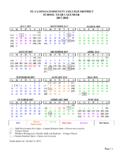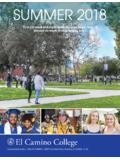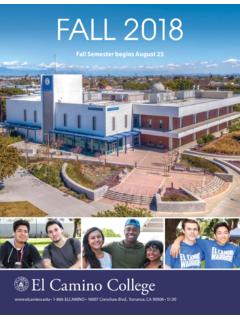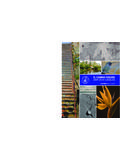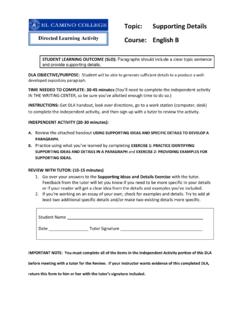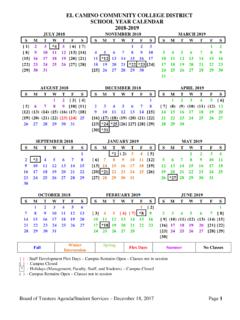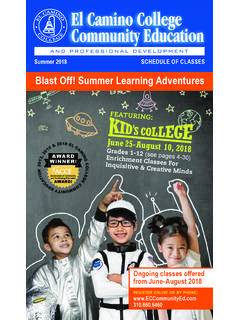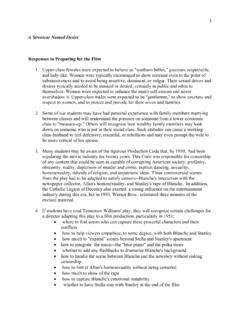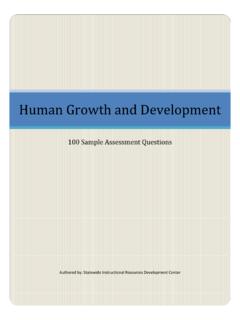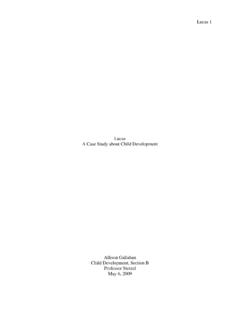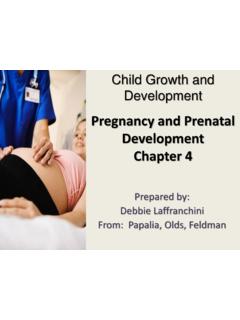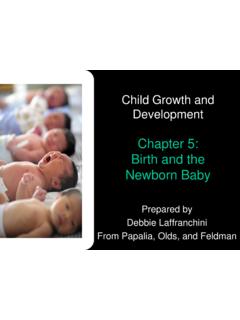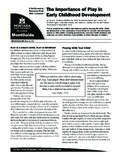Transcription of CD 103 Child Growth & Development - General …
1 CD 103 Child Growth & Development - General course information Instructor: Susan Baxter Email: Online Students use the Private Message System in Etudes If Etudes is not operating Online Office Hours: Friday 7 9 AM Required Materials Textbook The only textbook you will need for this course is below. Students can purchase the textbook at the ECC campus bookstore or through an online source, including the publisher. A reserve copy is held at the college library and the Teacher Resource Room (ARTB 313) all other reading material for the class is a combination of on line articles and video talks. The Access card is optional. Child and Adolescent Development , Loose-Leaf Version with Enhanced Pearson eText -- Access Card Package, 2/E the Access Card is optional Anita Woolfolk, The Ohio State University Nancy E.
2 Perry, University of British Columbia ISBN-10: 0133831515 ISBN-13: 9780133831511 2015 Pearson Unbound (saleable) with Access Card, 696 pp Published 03/14/2014 Suggested retail price: $ - See more at: # El Camino Distance Education information The following link is the Distance Education Link for Online Students. The contact information for the Distance Education support team is also located on this page. Please look at the Distant Education Student Handbook for questions and solutions for course management problems This is a direct link to the student s handbook: Class Orientation & Securing Space in Class There is NO on campus orientation. I am not available on campus, I live in Colorado. If you need more support than is available by email, I will direct you to resources in campus for help.
3 If a student wishes to remain in the class each student needs to complete the following 4 steps by the assigned dates: 1. Complete the "Introduction" in the Discussion and Private Message section of the course 2. Complete the course outline Scavenger Hunt assignment 3. Authorize that you have read the class syllabus so that you may have access to the course content. 4. Email the Instructor your alternative contact information through the ETUDES course private Message feature, not myecc email. Provide either personal email or phone number in case the course management system (ETUDES) or ECC system crash. A student may be dropped and another student added in his/her place if the 4 steps are incomplete. Catalog Description This course is an introduction to Child Development from conception through adolescence with an emphasis on physical, cognitive and psychosocial Growth .
4 The effect of environmental and cultural influences on Development will be investigated. Developmental theories will be analyzed and tested through practical applications such as Child observations and interviews. Note: This is a core course for all teachers and assistants in early childhood programs regulated by the State of California. course Objectives 1. Define developmental theory and explain how theories are used to understand Child behavior and Development . 2. Examine and discuss major theories of Child Development such as those of Piaget, Vygotsky, Freud, Erikson, and Bronfenbrenner. 3. Evaluate the effectiveness of theories in terms of their practical applications in parenting and teaching. 4. Analyze the interdependence of the cognitive, psychosocial and physical domains of Development .
5 5. Demonstrate knowledge of the physical, social/emotional, cognitive and language Development of children, both typical and atypical, in major developmental stages. 6. Demonstrate knowledge of current research findings as they apply to Child Development . 7. Define various methods of observation and utilize these methods to collect data. 8. Demonstrate objective techniques and skills when observing, interviewing, describing, 9. Analyze and interpret data collected through observations and interviews. 10. Examine and evaluate the role of family, teachers, and other professionals in facilitating the Development of children. 11. Examine and evaluate the role of play and its relationship to Development at various stages. 12. Analyze the effect of biological, environmental and cultural influences on Development of children of all ages.
6 Student Learning Outcomes (SLOs) SLO #1 Major Theoretical Frameworks Identify and compare major theoretical frameworks, such as Piaget, Vygotsky, Erikson, and Bronfenbrenner, as related to the study of human Development . SLO #2 Milestones Describe major developmental milestones and typical characteristics for children from conception through adolescence in the areas of physical, psychosocial, cognitive, and language Development . SLO #3 Research Methodologies Apply developmental theory to Child observations, surveys, and/or interviews using investigative research methodologies ADA Statement: El Camino College is committed to providing educational accommodations for students with disabilities upon the timely request by the student to the instructor. A student with a disability, who would like to request an academic accommodation, is responsible for identifying herself/himself to the instructor and to the Special Resource Center.
7 To make arrangements for academic accommodations, contact the Special Resource Center. Please Note: Students with disabilities who believe they may need accommodations in this course are encouraged to contact the Special Resource Center at 310-660-3295 as soon as possible to better ensure such accommodations are implemented in a timely fashion. As well, please contact me privately to discuss your specific needs. I am constantly working to upgrade my course material so that all students can access the information in a variety of modalities in accordance with IDEA. I might have missed something or did not realize a part of a module is not in compliance. If any student is having trouble accessing material or the resources you use to interpret the work, you cannot read parts of a Modules or an Assignment Guidelines, please let me know as quickly as possible via Etudes email.
8 There are always solutions that we can find so that you may fully participate in the online class. Student Code of Conduct Student Rights and Grievances Procedure 5530 Study and Preparation Time: College credit is given based on the formula of the Carnegie unit: for every one hour spent in class, you are expected to spend two hours in preparation and study time outside of class. This adds up to 6 hours per week for a 3-unit course . Spring 2016 Academic Calendar Martin Luther King Holiday - Campus Closed Monday, January 18, 2016 Weekday Classes Begin Tuesday, January 19, 2016 Add/Drop Period Begins (Full Semester Classes) (Short Term Classes Differ - See Short Term Calendar) Tuesday, January 19, 2016 Last Day to Add (Full Semester Classes) Friday, January 29, 2016 Last Day to Challenge Residency Status for Current Semester Friday, January 29, 2016 Last Day to Drop for an Enrollment Fee Refund (Full Semester Classes)
9 Friday, January 29, 2016 Last Day to Drop Without Notation on Permanent Record Friday, January 29, 2016 Last Day to Apply for Spring Degrees and Certificates Thursday, February 11, 2016 Lincoln s Day Holiday - Campus Closed Friday, February 12, 2016 Washington s Day Holiday - Campus Closed Monday, February 15, 2016 Spring Recess, No Classes Saturday - Friday/March 12 - 18, 2016 Mid-Term Classes Begin Saturday, March 19, 2016 Last Day to Drop with a W Friday, April 15, 2016 Last Day of Spring Semester Friday, May 13, 2016 Commencement Friday, May 13, 2016 BUILDING A CLASS COMMUNITY & SKILLS FOR SUCCESS! In order to succeed in this course I invite you to: 1. Have regular and reliable access to a computer. Computer issues need to be resolved by the student and are not an excuse for missing assignment submissions.
10 2. Be willing to read, read, and re-read the syllabus and all other posted materials. 3. Understand that the 8 Modules are considered the same as it would be to attend lectures on campus. It is expected that all 8 will be completed. Assignments are based on the content of Modules and the textbook chapter being studied in the corresponding week and are worth 80 points. 4. Read ALL ANNOUNCEMENTS. 5. Complete all 8 Modules 6. Be a self-motivated learner and possess good time management skills. 7. COMMUNICATE with me and with your classmates. Be willing to ask your instructor and classmate s questions if you don t understand something. There are chat rooms and email systems with in the class site to do this. I am also accessible by email if you are having trouble using the ETUDES program Dropping this Class I am hoping that you all complete this class and have a wonderful, rewarding learning experience.
